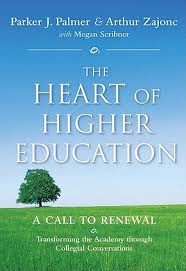While most all of us who pursue careers in higher education are idealists, those that are willing to share their aims and ideals are not all that common. The realities of academia in the twenty-first century are sobering and it’s often safer to keep idealism closeted. When we do encounter the baldly stated hope for education that can transform, it is a reminder of the power and promise of our profession.
Idealism is at the center of Parker J. Palmer and Arthur Zajonc’s The Heart of Higher Education: A Call to Renewal – Transforming the Academy Through Collegial Conversations. Palmer is a well-known educator and writer, perhaps best known for his Center for Courage and Renewal. The Center encourages and advances ethical behavior through personal and professional integrity. Zajonc is a physicist and author. He also leads the Mind and Life Institute, which studies the relationship between Buddhism and science. In The Heart of Higher Education, Palmer and Zajonc examine the possibilities of integrative education through conversations and dialogues. It is not a transcript. Instead, the book is a loose dialectic of exploration.
Integrative education is a general movement that seeks to educate students holistically, looking at the relationships between academic studies and the purpose, meaning, and aspirations of their lives. It is about educating the “whole” student: mind, spirit, and heart. Palmer and Zajonc realize that this is an ambitious goal and that there are significant objections. Integrative education rests on a weak philosophical foundation, poorly categorized, and uncomfortable for many in higher education. In affirming its possibilities, the authors advance ways of addressing these shortcomings. They believe that integrative education can bridge deep divides in how we think about and experience higher education. Drawing from philosophers, educators, students, colleagues, and personal experience, they endorse a mixture of Plato and Dewey to transform lives. Interestingly, however, they completely bypass the works by existential philosophers who addressed similar challenges in searching for meaning in a fragmented world.
Integrative education appeals to all in us that hopes to transform students. It touches something ineffable about the potential of an education to make a real difference. I am not convinced, however, that integrative education is as much a theory of education as the sort of education that a certain kind of educators practice. These are the educators who lead and inspire. They are at home with their idealism.
An academic friend and colleague once had me in stitches recounting her response to an innovation being championed by an administrator who had recently joined her institution. She said “I think I know how the Native Americans felt when the Pilgrims arrived.” She added that many at the institution had been educating students successfully for quite some time – though they perhaps could have done a better job publicizing it.
We need both the dreamers and the pragmatists in higher education – and the more that both share, the better for all.
David Potash
